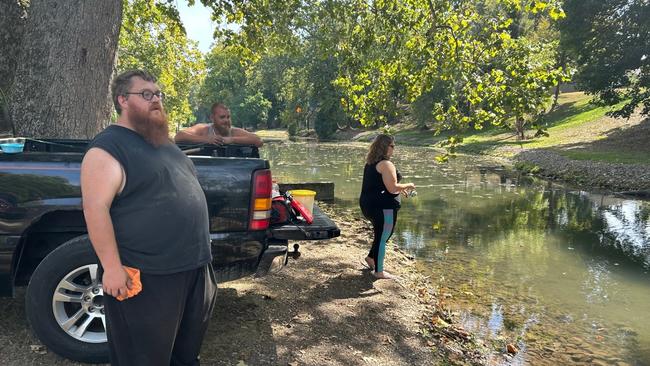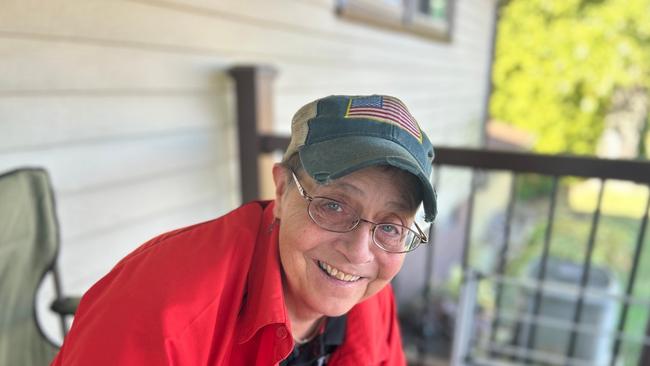Fear and suspicion in Springfield, the city at the centre of ‘cat-eating’ storm
Claims by GOP presidential candidate Donald Trump that Haitians are eating pets and geese put an unwanted spotlight on a rust belt city where the migrant population has grown quickly.

If someone wanted to snatch a goose from the creek that runs through Snyder Park in Springfield, it would not be difficult. “They will take food out of your hand,” Anthony Hall, 34, said as he cast his fishing rod into the water. “They are not scared.”
Every so often Hall returns to this spot in the Ohio city, which finds itself with an unexpectedly prominent role in the presidential election. He has never seen a Haitian, as Donald Trump told his supporters at a rally on Thursday, “walking off with the town’s geese”.
Trump had already claimed in the debate with Kamala Harris on Tuesday that Haitian migrants were “eating the dogs … they’re eating the pets of the people that live there”.
The claims were as outlandish as they were false, but the former president may have kept migration at the forefront of voters’ minds.

To understand how this small rust belt city, grappling with profound demographic change, was thrust into the national spotlight to serve as an example of the power of rumour in political discourse, is to understand its recent history.
More than a decade ago, officials sought to attract employers by filling unwanted manufacturing jobs with migrants. In recent years, an estimated 15,000 Haitians have joined the city’s population of 58,000.
Resentment has been building. This was amplified in August last year when, on the first day of the new school year, a Haitian without a legal driving licence crashed his van into a school bus. An 11-year-old boy was killed when he was thrown from the bus.


Viles Dorsainvil, a Springfield community leader, arrived in the US from Haiti in December 2020. “Haitians have been facing a lot of threats,” he said. “[People] have vandalised their houses, broken their cars and even pointed guns at them.”
The claim about cats and dogs, however, has dominated headlines. Several posts on Facebook and X have alleged that pets are being abducted by “people who shouldn’t be in this country”. In one post, since deleted, someone said that a neighbour’s daughter had found her pet cat hanging from a branch at a Haitian’s house and being carved up to eat. The post also alleged that Haitians were stealing ducks and geese from Snyder Park.
There is no evidence that any of this is true and there are suggestions that the rumours may have stemmed from an incident 160 miles away where a woman born in Ohio was charged with animal cruelty for killing and eating a cat. It might have ended there, were it not for Elon Musk and the Ohio senator JD Vance, Trump’s running-mate, who shared the claims after police and officials debunked them.
Musk posted a video of a resident who said immigrants were eating ducks taken from parks. Trump’s supporters flooded the internet with fake images of him protecting cats and ducks.

As the furore intensified this week, news emerged of someone calling police in Clark County, which includes Springfield, in August to say that he had seen four Haitians carrying geese near a bike trail. Melanie Flax Wilt, the Clark County commissioner, said that officers were sent on a “literal wild goose chase” to investigate.
Matters became more serious on Thursday when police cleared Springfield City Hall after a bomb threat. A local school was among the threatened locations.
Diana Daniels, 68, a former teacher and a critic of the authorities’ handling of migration, said she believed the rumours about cats, dogs and geese but conceded that her belief might be motivated by anger. “Are we frustrated enough to run with it just because we’re frustrated?” she asked on her porch overlooking fields of soya on the city outskirts. “Yeah.”

Daniels said Springfield was a “pay cheque to pay cheque kind of community” typical of the rust belt, where populations dwindled as factories closed and manufacturing was outsourced. The white working-class voters of Ohio, Michigan, Pennsylvania and Wisconsin will be vital for Trump in November.
Life for the Haitians who have fled violence and poverty continues to improve. President Joe Biden has granted temporary protected status to hundreds of thousands of immigrants, and an estimated half a million Haitians are working under the status.
Mike DeWine, 77, the Republican governor of Ohio, who also runs a charity in Haiti, promised this month to expand access to healthcare for migrants in Springfield. “The Haitians who are here are hardworking people,” he said.
Philomene Philostin, a businesswoman, pastor and local radio host who moved to the US from Haiti in 1994, said she agreed.
“People are greedy for work,” she added. “If you give Haitian people eight hours to work, eight hours is not enough for them. We came in here, we built Springfield.”

Although wages in the city have risen and more jobs have been created, the expansion has put a strain on public services such as healthcare and education.
Another point of contention is people from Haiti driving without licences. The father of the boy who was killed in the school bus crash, Nathan Clark, has been one of the most vocal advocates for reconciliation, criticising people who use his son’s death for political gain.
“I wish that my son, Aiden Clark, was killed by a 60-year-old white man,” he said this week. “I bet you never thought anyone would say something so blunt. But if that guy killed my 11-year-old son, the incessant group of hate-spewing people would leave us alone.”
Daniels said she had no animosity towards the Haitian community but that anyone who raised concerns was dismissed as “racist and xenophobic”.
She said: “I have been for a year begging the city to sit down with a core group of us and talk about solutions that just might prove fruitful. We’ve never been asked to the table.”

Dorsainvil urged Trump to stop mentioning Springfield. “As public leaders are seeking the highest office of the US, what they say matters,” he said. “It can create a peaceful environment. At the same time, it can divide a community or a country and cause it to escalate to massive violence.”
Heidi Earlywine, who teaches English to Haitians in Springfield at weekends, said she feared the situation would get worse as the election approached.
“The match has been lit to make the people who are afraid feel more afraid,” she said. “I’ve been counselling Haitian community members to say this is a presidential election, the most powerful person on the planet is about to get elected. They are grabbing any straw they can and unfortunately they’re ripping you apart.”
Back in Snyder Park, the attitude of many in the city can be summed up by Hall and his fellow fishermen.
Even though there is no evidence to support the claims about cats and dogs, he is happy to add to the intrigue. There were fewer geese on the creek than last year, he said conspiratorially. “It’s so odd to me that they are not around here. That kind of makes me feel like they know something we don’t.”
The Times






To join the conversation, please log in. Don't have an account? Register
Join the conversation, you are commenting as Logout